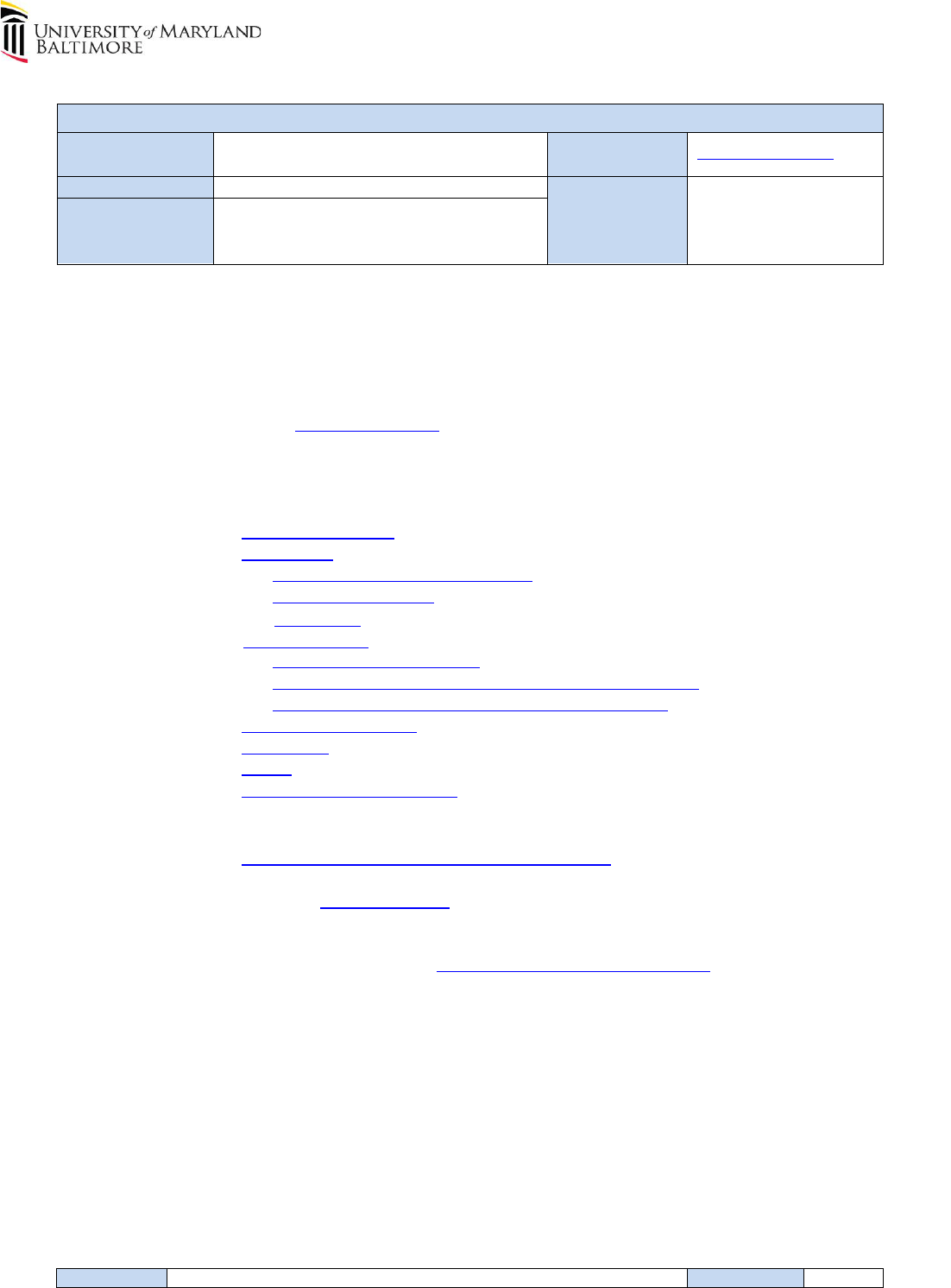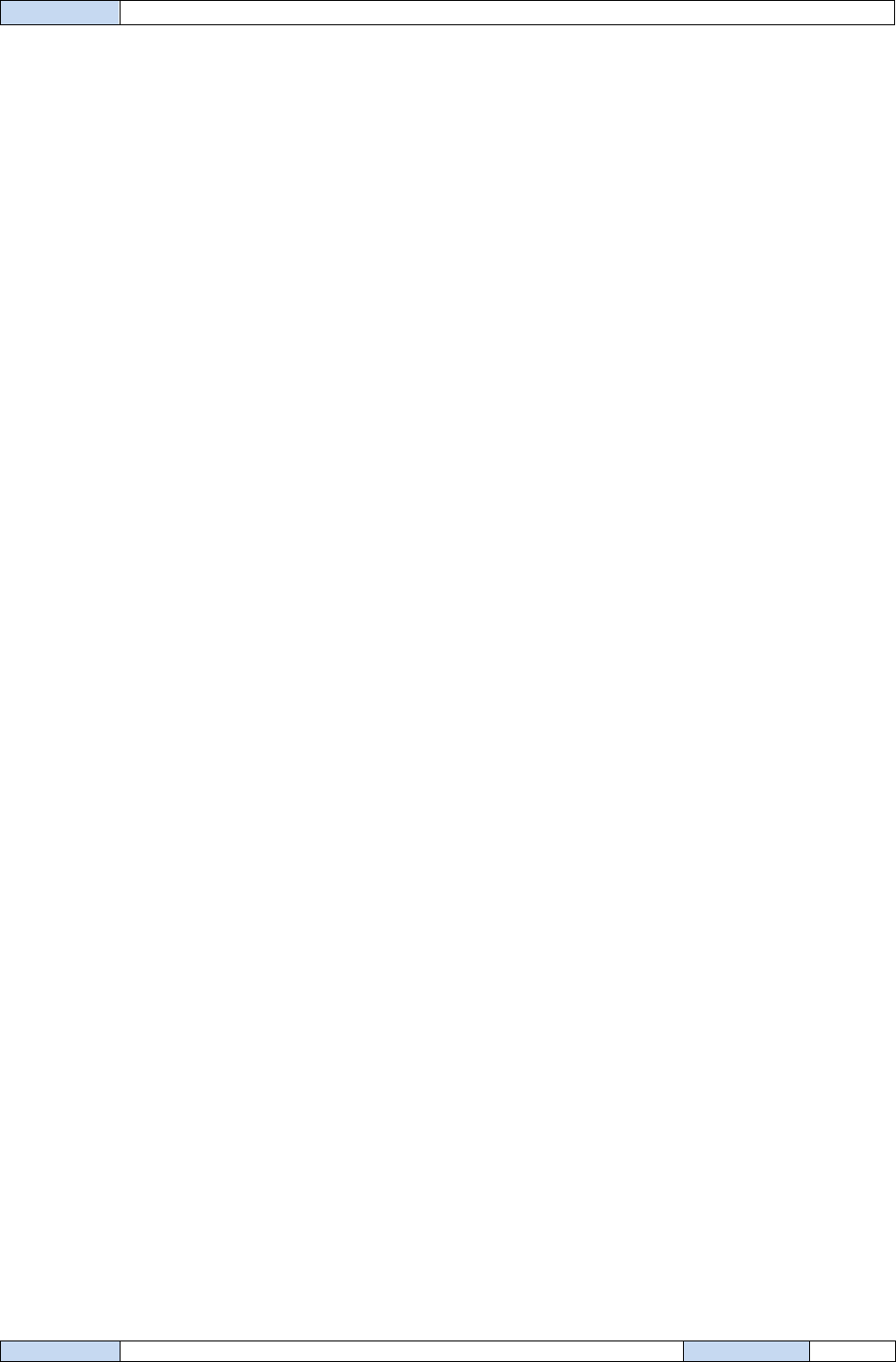
Last Updated
September 17, 2015
Page
1 of 6
ADMINISTRATION AND FINANCE
Financial Services Standard Operating Procedure No. 3511
Title
Customer Billing and Collections
Related Policy
No.
UMB VIII 6.00 (A)
Last Updated
September 17, 2015
Refer
Questions To
Associate Controller
Financial Services
410-706-2509
Approved By
Kathleen Byington
Chief Administrative and Finance
Officer
Purpose
This procedure establishes instructions and guidelines for billing external persons and
organizations for goods and services provided by University of Maryland, Baltimore (UMB)
departments through non-sponsored project activities in accordance with UMB policy VIII-
6.00 (A).
Scope
This procedure applies to all billing arrangements between UMB and external entities,
except for sponsored project billings and student tuition and fee billings. Generally, the
billing arrangements covered under this procedure are related to state, auxiliary, and
revolving fund activities, but other activities may fall under this procedure. This
procedure does not apply to interdepartmental billings.
Contents
I. General Guidelines
II. Procedures
A. Invoicing for Goods and Services
B. Invoice Adjustments
C. Collections
III. Responsibilities
A. Schools and Departments
B. Department of Financial Services-General Accounting
C. Department of Financial Services-Cashier’s Office
IV. Terms and Definitions
V. Exceptions
VI. Forms
VII. Related Training/Guidance
General
Guidelines
I. Financial Services-General Accounting (FS-GA) utilizes the billing module within the
eUMB financial system to generate, process, and account for transactions between
UMB and external entities. This module is considered the UMB Customer Billing
System (CBS).
II. Departments submit an Online Invoice Request Form (OIR) with supporting
documentation to FS-GA. The supporting documentation must include a description
of the goods or services rendered, amount(s), recipient, and transaction date. FS-GA
may ask for additional information as needed to process the OIR.
III. Generally, invoice requests will be processed within two business days after being
received in FS-GA with sufficient supporting documentation.
IV. Customer payments are due within 30 days of the invoice date (i.e. payment term is
“Net 30”).

Customer Billing and Collections
SOP Title
Last Updated
September 17, 2015
Page
2 of 6
V. Customers are encouraged to mail payments to the lockbox address provided on the
invoice. Payments are also accepted in the Cashier’s Office located at 601 W.
Lombard Street, 2
nd
Floor.
VI. After FS-GA processes payments, the chartstring entered by the requesting
department on the OIR will be credited. Generally, the department receives the credit
on the next business day after the payment is processed.
VII. The owner of the department project that will receive the revenue is responsible for
collecting amounts due on unpaid invoices, and must support FS efforts to collect
unpaid invoices and debts.
VIII. Departments are responsible for analyzing accounts receivable aging reports to
determine whether additional action may be needed to collect amounts due.
IX. Dunning letters are generated monthly by FS-GA for invoices over 30 days past due
and until an invoice is over 120 days past due. FS-GA will mail dunning letters to the
customer at the address stored in CBS.
X. FS-GA will transfer uncollected accounts over 120 days past due to the State of
Maryland Central Collection Unit (CCU) as required by State regulations. CCU adds a
fee to the outstanding balance of the account.
XI. If FS-GA is aware that a claim for payment is disputed, it will notify the department
involved, and work with University Counsel and assigned FS personnel to evaluate
the defenses and consider whether to adjust the invoice.
Procedures
I. Invoicing for Goods and Services
A. Requesting Invoices
1. Department completes the Online Invoice Request Form (OIR).
2. Enter detailed information as instructed such as dates of service, description
of product or services, amount, etc.
3. Upload documents to be attached and mailed with the invoice.
4. Click the submit button to deliver the OIR and any attachments to FS-GA.
B. Processing Invoices
1. FS-GA reviews and enters the OIR information into CBS.
2. FS-GA prints and mails processed invoices to customers, unless other
arrangements have been made.
3. Payment instructions are included in the printed invoice.
C. Payments
1. The preferred method for payment is to send a check or money order to the
Customer Billing Lock Box at the address printed on the invoice.
2. Customers may also pay invoices at the Cashier’s Office using a check, credit
card, money order, or cash.
3. Payments received by a UMB department must be deposited at the Cashier’s
Office no later than the first working day after the day of receipt. When
possible, receipts should be deposited on the day received, especially when
large amounts are involved. The Deposit Summary Form and instructions for
departmental deposits are available on the Cashier’s Office website.

Customer Billing and Collections
SOP Title
Last Updated
September 17, 2015
Page
3 of 6
4. Payments may be made by wire transfer, ACH, or interagency transfer as
instructed on the invoice.
5. Fees associated with payments, such as credit card transaction fees, wire
transfers, and exchange rate differences will be charged to the chartstring
listed on the OIR.
D. Accounting
1. CBS creates the following accounting entry at the time an invoice is
processed:
Debit Department Project Account Receivable (7132)
Credit Department Project Deferred Revenue (8530)
2. After FS-GA applies the payment to an invoice, CBS creates the following
accounting entries:
a. Debit Department Project Deferred Revenue (8530)
Credit Department Project Account Receivable (7132)
b. Debit Department Project Cash (7010)
Credit Department Project Revenue (0XXX) designated on the OIR
3. Accounting entries are posted to the general ledger (GL) after the nightly
process runs in eUMB Financials.
II. Invoice Adjustments
An adjustment may be needed to correct an error, change the amount billed, reverse
an invoice, or correct the accounting information (e.g. wrong department number,
etc.).
A. Department emails FS-GA to request an adjustment.
B. Includes the original invoice number and documentation describing the reason
for the adjustment.
C. FS-GA may request additional information to substantiate the adjustment
request; FS-GA reviews the information and may consult University Counsel and
others in campus administration.
D. If FS-GA accepts a request for adjustment, it enters the adjustment into CBS.
E. FS-GA prints and mails adjustment invoices to the department.
III. Collections
A. Dunning letters are generated monthly by FS-GA for invoices over 30 days past
due until an invoice is over 120 days past due. FS-GA mails dunning letters to
the customer at the address stored in CBS.
B. After three dunning letters have been sent to the customer, FS-GA transfers
delinquent customer accounts to CCU.
C. CCU adds a collection fee to delinquent accounts. The customer is responsible
for paying collection fees.
D. Departments must monitor their receivables and work with FS-GA to support
collection efforts when needed.
E. Departments must notify FS-GA immediately if a customer is known to be
insolvent or to file for bankruptcy protection.
Responsibilities
I. Schools and Departments
A. Initiate invoice requests using the Online Invoice Request form.

Customer Billing and Collections
SOP Title
Last Updated
September 17, 2015
Page
4 of 6
B. Submit invoice requests timely to FS-GA.
C. Retain all supporting documentation (e.g. agreements, event information,
attendees, etc.).
D. Regularly review accounts receivable aging reports to identify payments and
delinquent customer accounts.
E. Monitor and resolve issues related to open receivables.
II. Department of Financial Services-General Accounting
A. Oversee Customer Billing System functions.
B. Process invoice requests timely.
C. Mail invoices to customers, unless other arrangements have been made.
D. Apply payments timely.
E. Mail dunning letters to customers.
F. Send to CCU delinquent accounts that are unpaid after three dunning letters to
CCU. Send delinquent accounts to CCU immediately if the customer is known or
suspected to be insolvent or bankrupt.
III. Department of Financial Services-Cashier’s Office receives and posts payments to GL
account 7136 - CBS Clearing.
Terms and
Definitions
Term
Definition
Accounts Receivable
Aging Report
A periodic report that presents outstanding receivables.
The report is a tool for identifying payments, unpaid
invoices, length of time invoices remain unpaid, and the
amounts due UMB.
Chartstring
A grouping of individual chartfields that in combination
with each other represents a unique funding identifier
where accounting/financial activity is recorded.
Customer Billing
Lock Box
A service offered by the bank to receive and process
deposits. UMB uses the lock box to facilitate check and
money order payments and deposits.
Customer Billing
System (CBS)
Module within the financial system used to generate,
process, and track university invoices, related reports,
and dunning letters.
Dunning Letter
A notification to a debtor of an outstanding debt owed
to UMB. The dunning letter includes outstanding
balance and contact information, demand for payment,
and information about additional collection action that
may be taken.
External Entity
A separate organization or individual that enters into an
agreement with UMB. External entities are not included
in UMB’s financial system. Examples include private
and public companies, nonprofit organizations
(including UMB affiliates that are separately
incorporated or otherwise not organized legally as part
of UMB), and individuals.
Financial Services-
Cashier’s Office
Unit located in the Department of Financial Services-
Student Accounting that receives cash, credit card,
check, and money order payments for UMB invoices.

Customer Billing and Collections
SOP Title
Last Updated
September 17, 2015
Page
5 of 6
Financial Services-
General Accounting
(FS-GA)
UMB central administrative department within
Administration and Finance that oversees customer
billing, capital assets, requisition approvals, journal
entries, and year-end processes.
Sponsored Project
An externally funded activity that is separately
budgeted and accounted for according to the terms of
the Sponsor. Sponsored projects include grants,
contracts, and cooperative agreements for research,
training, and other public service activities.
State of Maryland
Central Collection
Unit (CCU)
The unit within the Department of Budget and
Management state agency responsible for acting as a
collection agency when UMB is unsuccessful in
collecting amounts due from others.
Exceptions Exceptions to this procedure must be approved in writing by the Controller in FS. All
requests must be submitted to the Controller using the Procedure Exception Request
Form available on the website. The request must be signed/e-mailed by the
Department Head or designee.
Exceptions to the related policy, UMB VIII-6.00 (A) Customer Billing and Collections, must
be approved in writing by the Chief Administrative and Finance Officer (CAFO). Requests
may be submitted to the Controller using the Policy Exception Request Form.
Alternatively, a policy exception request may be submitted in the form of a memo to the
CAFO. Policy exception requests must be signed by the appropriate Dean/Vice President
or Associate Dean/AVP.
Forms Forms can be obtained from the Financial Services website:
http://www.umaryland.edu/financialservices/forms/
Form Name
Completed by
Sent to
Purpose
Deposit
Summary
Form
Department
Cashier’s
Office
Used to record and process
payments received by departments.
Related
Training/
Guidance
I. UMB CBS AR Aging Report
A. UMB Systems Tutorials Browser Link: -
http://cf.umaryland.edu/ondemandtraining/enterprise/PlayerPackage/data/toc.
html
B. In the MyUMB portal Enterprise Menu: eUMB Financials> UMB Systems Tutorials
Browser>UMB Customer Billing System
II. Related Policies and Procedures
A. COMAR 17.01.01 Standards for Administrative Collection of Claims

Customer Billing and Collections
SOP Title
Last Updated
September 17, 2015
Page
6 of 6
B. Comptroller of Maryland General Accounting Division Accounting Procedures
Manual Section 5.2
C. USM Policy VIII–6.00 Policy on Business Activities
Effective: November 1, 2015.
